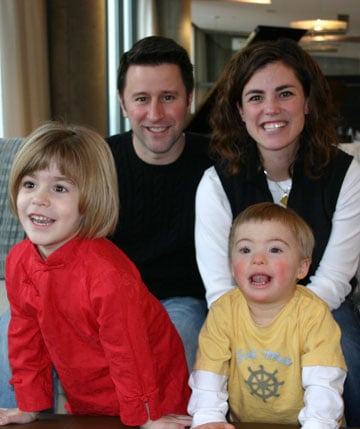
The Broyles Family
The Invisible Safety Net
You can’t see it, but it’s there. You hear it in the friendly phone call from your neighbor. You feel it in your aunt’s offer to baby-sit. You sense it when you are inspired by another parent of a child with a disability.
Individually, each of those encounters may seem like just a pleasant moment. Together, however, they form something important, even essential for families of children with disabilities. Such connections become an informal support network that provides encouragement, strength, information, and practical help. Whether you seek them out or they just unfold, such a network can make a world of difference in your family’s daily life. How you create those connections is as individual as you are.
Two years ago, Jessica Broyles found herself dealing with an unexpected turn of events. She went into labor 6 ½ weeks early, then was told that her newborn, Sam, had Down syndrome. With 21-month-old Maggie at home, she and her husband were faced with keeping the family on an even keel while adjusting to life with a child with a disability.
"The first month, when Sam was still in the hospital, we didn’t go beyond family for support," Jessica says, noting that her parents, mother-in-law, brother and sister were nearby. “They helped tons. They always stopped by, so we didn’t become isolated.
"We learned about PACER Center right away," Jessica says. "PACER’s early childhood coordinator gave us an overview of early childhood special education and sent us invaluable advice on everything from setting up an Individual Family Service Plan (IFSP) to working with doctors. PACER has been an invaluable resource in helping us to set expectation and understand Sam’s educational rights."
The circle soon expanded to include Sam’s pediatrician, who provides both practical and emotional support. Then it encompassed physical, speech, and occupational therapists. “They take a genuine interest in Sam,” Jessica says. She notes that they share lots of encouraging stories about other children who have Down syndrome and talk about possibilities for the future. “They are so positive about everything,” Jessica says.
Eventually, friends and other families of children with disabilities became part of their world. The family was surprised and delighted when two aunts joined in enthusiastically. "They totally zeroed in on Sam and are so attached to him," Jessica says, noting that they are always eager to baby-sit.
Other families have found different ways to build their networks. Some without relatives in town have turned to disability-specific organizations or to support groups where they can meet others in a similar situation. As connections develop, occasional phone calls or weekly e-mails become supportive touches as parents share observations about their children’s milestones and challenges.
For some, physical therapists are a lifeline, providing information on how other parents have handled situations. For many, PACER Center becomes a major support. Through workshops, consultations with advocates, written materials, and more, parents receive the information and tools they need to advocate for their child.
Parents agree that when you have a child with a disability, it’s a different world and culture. Whatever your needs, it can be a world rich with support, says PACER. Just look around to the family, friends, neighbors, doctors, therapists, support groups, and organizations that surround you, and you can build a network that suits your style.
